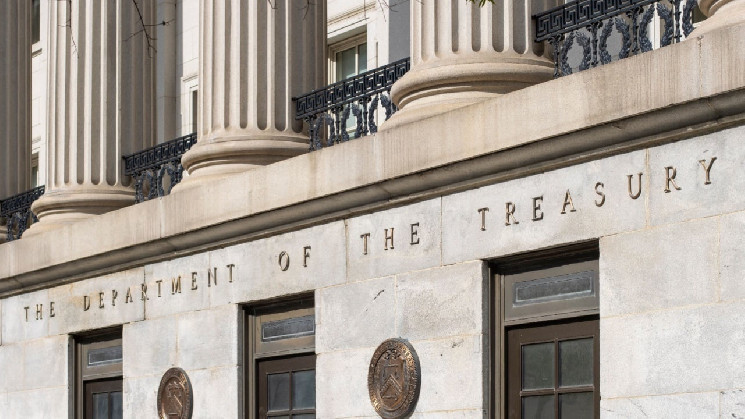Biden’s New Crypto Rule Shakes Entire Industry – Full IRS Oversight Incoming

The U.S. Treasury’s sweeping IRS rule forces crypto platforms to track and report all transactions, igniting fierce industry backlash and looming legal battles over its survival.
US Treasury Expands IRS Reach – Crypto Industry Faces Full Reporting Rule
The U.S. Department of the Treasury and the Internal Revenue Service (IRS) have finalized sweeping new regulations for brokers facilitating digital asset transactions, scheduled for publication in the Federal Register on Dec. 30. The new rule mandates brokers, including certain decentralized finance (defi) platforms, to track and report user activity, covering sales of all digital assets, including non-fungible tokens (NFTs) and stablecoins.
Bill Hughes, Senior Counsel at Consensys and a prominent voice in the crypto community, explained on social media platform X on Friday: “Treasury/IRS has finalized their defi broker tax reporting rule. Trading front ends would have to track and report on user activity—both US persons and non-US persons—starting in 2027. And it applies to the sale of every single digital asset—including NFTs and even stablecoins (all cost, no benefit from a revenue perspective).” Warning that legal challenges are imminent, Hughes stressed:
First, a lawsuit will be filed claiming that the rule is beyond the authority of Treasury and violates the Administrative Procedure Act. Later, the rule will likely come under Congressional review where it can be disapproved of.
“This rule has been ready to go for a while now. They dump it the last Friday of 2024 in the middle of a holiday stretch on purpose, obviously. As if we wouldn’t notice or make an absolute ruckus over it,” he noted.
The finalized rule broadens the definition of brokers to include trading front-end services, custodial wallet providers, and decentralized exchanges involved in digital asset sales. The regulations cover not just traditional custodians but also platforms and wallet interfaces facilitating transactions. The IRS classifies decentralized finance front-end services as brokers if they enable transactions, even without direct custody of assets. Platforms using smart contracts to connect users with digital asset protocols must verify identities and report gross proceeds, applying the same standards as centralized exchanges. Brokers must issue Form 1099-DA for digital asset transactions and keep records for seven years.
The Treasury claims that this expansion aims to align tax reporting in the digital asset space with the reporting requirements imposed on traditional securities brokers. They emphasized that these measures are essential to closing the tax gap and increasing transparency in digital asset markets.
Critics, including lawyer Jake Chervinsky, echoed Hughes’ sentiment, arguing the regulation overreaches. “IRS has finalized the second half of its broker rule, requiring most defi front-ends to KYC users starting in 2027,” Chervinsky shared on X, emphasizing:
This unlawful rule is the dying gasp of the anti-crypto army on its way out of power. It must be struck down, either by the courts or the incoming administration.
Caitlin Long, founder of Custodia Bank, criticized the Biden administration’s new broker rule, calling it overly broad and part of an effort, supported by Senator Elizabeth Warren, to undermine the U.S. crypto industry. Long argued: “Evisceration of the new Biden/Warren broker rule (which is aimed at killing US crypto)… it’s written so broadly that it applies to ISPs & web browsers, which face new IRS reporting requirements.”
President-elect Donald Trump is scheduled to take office on Jan. 20, 2025. His administration is expected to implement pro-cryptocurrency policies, signaling a shift from the Biden administration’s stance. Trump has pledged to end what he describes as the “anti-crypto crusade” of the Biden era, with plans to establish the U.S. as the “crypto capital of the planet.” Key initiatives include creating a national bitcoin reserve, ensuring banking access for crypto firms, and forming a crypto advisory council.





 Bitcoin
Bitcoin  Ethereum
Ethereum  Tether
Tether  Dogecoin
Dogecoin  USDC
USDC  Cardano
Cardano  TRON
TRON  Chainlink
Chainlink  Hedera
Hedera  Stellar
Stellar  Bitcoin Cash
Bitcoin Cash  LEO Token
LEO Token  Litecoin
Litecoin  Cronos
Cronos  Ethereum Classic
Ethereum Classic  Monero
Monero  Dai
Dai  OKB
OKB  Algorand
Algorand  Cosmos Hub
Cosmos Hub  Stacks
Stacks  Theta Network
Theta Network  Gate
Gate  Tezos
Tezos  Maker
Maker  KuCoin
KuCoin  IOTA
IOTA  NEO
NEO  Zcash
Zcash  Polygon
Polygon  Synthetix Network
Synthetix Network  Tether Gold
Tether Gold  Dash
Dash  TrueUSD
TrueUSD  Holo
Holo  Zilliqa
Zilliqa  0x Protocol
0x Protocol  Enjin Coin
Enjin Coin  Basic Attention
Basic Attention  Qtum
Qtum  Siacoin
Siacoin  Ravencoin
Ravencoin  Decred
Decred  NEM
NEM  Ontology
Ontology  DigiByte
DigiByte  Huobi
Huobi  Nano
Nano  Bitcoin Gold
Bitcoin Gold  Status
Status  Steem
Steem  Lisk
Lisk  Hive
Hive  Waves
Waves  Numeraire
Numeraire  Pax Dollar
Pax Dollar  BUSD
BUSD  OMG Network
OMG Network  Ren
Ren  Bitcoin Diamond
Bitcoin Diamond